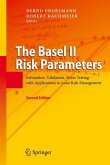The year-long consultations on Basel II mirror the international popularity of capital requirements as a regulatory instrument. Yet, the impact of capital re quirements on banks' behavior is not fully understood. The aim of this study is to contribute to this understanding by answering the following questions: How do banks adjust capital and risk after an increase in capital requirements? How do banks adjust their regulatory capital buffer over the business cycle? And what is the impact of banks' charter value on the regulatory capital buffer? The research undertaken for this study has benefited from support in terms of ideas, research facilities, and, not least, financial funding. My thanks go first of all to Claudia M. Buch for her constant encouragement, her continuous guidance, and her confidence in my research ideas. My thanks go also to the Kiel Institute for World Economics and its staff for providing a very fertile academic ground for my research and for providing excellent research facilities. In fact, conduct ing this study would not have been possible without the support of my colleagues at the Kiel Institute and elsewhere. In particular, I am grateful to Horst Siebert for providing me the freedom to pursue this topic. My special thanks go to Jorg Breitung, Kai Carstensen, and Dieter Urban for providing input on econometric issues. I am also grateful to Andrea Schertler for the long and productive discus sions I had on various parts of this study.
Bitte wählen Sie Ihr Anliegen aus.
Rechnungen
Retourenschein anfordern
Bestellstatus
Storno








